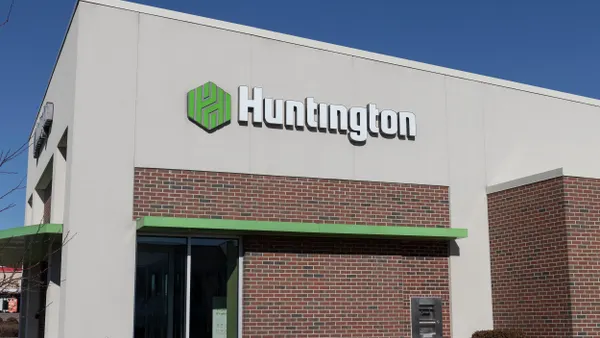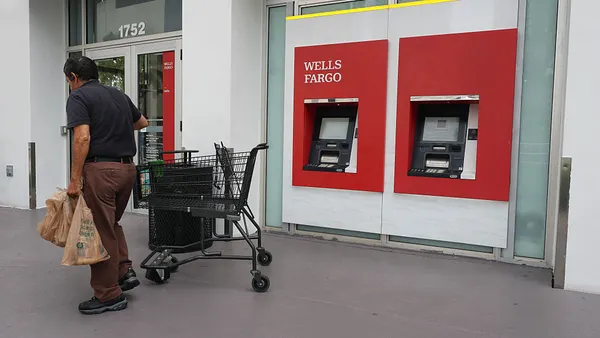UPDATE: April 21, 2020: The Treasury Department is reviewing whether it has the legal authority to prevent banks and private debt collectors from using $1,200 government stimulus payments to collect on overdrafts, a person familiar with the matter told The Washington Post.
UPDATE: April 17, 2020: USAA has changed its policy, such that it will pause collection of overdrafts by customers of its federal savings bank for 90 days from the date the stimulus check was deposited, the San Antonio Express-News reported Friday. The military-focused insurer will apply the policy retroactively to members who had a portion or all of their funds taken by the bank in recent days.
“This will allow members access to their full stimulus payment to help cover the costs of rent, food and other important necessities,” USAA spokesman Matthew Hartwig told the Express-News in an email.
Dive Brief:
- Wells Fargo, Citi and JPMorgan Chase have enacted temporary policies to ensure customers with negative account balances get their full coronavirus stimulus checks.
- Some financial institutions are applying the stimulus check to negative balances, then passing the remainder on to the consumer, The New York Times reported Thursday.
- A spasm of activity — likely from the number of customers attempting to check their balances to see if stimulus checks had arrived — caused access issues Wednesday on the apps and websites of several banks, including JPMorgan Chase, Citi, Truist, U.S. Bank, PNC and Fifth Third.
Dive Insight:
The CARES Act prohibits garnishing stimulus money for state or federal debts, except for court-mandated child support. But the lack of guidance on debt to public or private companies is drawing the rancor of lawmakers.
"For weeks, we have pressed the Treasury Department to exercise its authority and ensure that Americans receive the full amount of their stimulus payments," Sens. Elizabeth Warren, D-MA, and Sherrod Brown, D-OH, wrote in a letter Wednesday to American Bankers Association President Rob Nichols. "While Treasury has refused to follow congressional intent, that does not give banks license to steal the stimulus payments from their customers."
Twenty-five state attorneys general on Monday wrote Treasury Secretary Steven Mnuchin to voice their outrage over the garnishing of stimulus checks.
"During this public health and economic crisis, the states do not believe that the billions of dollars appropriated by Congress to help keep hardworking Americans afloat should be subject to garnishment," they wrote.
Several of the biggest U.S. banks are making sure their customers can access their full checks. Wells Fargo is setting aside negative balances for 30 days. Citi, meanwhile, said it will provide a temporary credit against a customer’s negative balance.
"The goal is to get money in consumers' hands as easily and quickly as possible," Ed Kadletz, head of Wells Fargo’s deposit products group, told Bloomberg.
The bank said it will also cash stimulus checks for people without Wells Fargo accounts, without charging a fee.
Some JPMorgan Chase customers with negative balances will see their payment returned to the Treasury Department, allowing the government to mail the check instead, the bank told Bloomberg.
"We are temporarily crediting the overdrawn amount for customers, giving them full access to their stimulus payment," Anne Pace, a JPMorgan Chase spokeswoman, wrote in an email to the Times. "We hope this gives them a chance to catch their breath."
Both the Times and Reuters reported Bank of America is also invoking a special stimulus-related overdraft policy.
The first checks issued as part of the $2 trillion coronavirus stimulus package landed in customers' accounts this week. Under the relief package, anyone who earns $75,000 or less in adjusted gross annual income and has a Social Security number will receive $1,200. Married couples who file joint tax returns and earn less than $150,000 in adjusted gross income will receive $2,400. Those who earn more will get less.
However, some financial institutions are keeping overdrawn customers' money. When the Treasury Department deposited Benji Pedro’s $1,200 stimulus check into his Safe Federal Credit Union account, the credit union applied the check to Pedro’s $2,650 overdraft, The New York Times reported. Pedro, a 24-year-old South Carolina recording artist who lives with his girlfriend and their child, said he planned to ask the Treasury Department to mail him a check. But the money was direct-deposited before he could. He said the overdraft was from subscriptions to two online music services he had forgotten to cancel.
USAA, which serves members of the military and their families, reportedly told a Minneapolis woman, who did not want to be identified, it was keeping the $2,400 stimulus check meant for her and her disabled veteran husband because their account was overdrawn. The woman, who had to quit her job after being unable to find child care when Minnesota ordered all day care centers to close, told The New York Times she was planning to use the money to pay rent and buy formula for her infant daughter.
The woman showed The New York Times screenshots of a Twitter exchange between her husband and a USAA representative, who said, "any deposits to the account will go toward the negative amount owed to the bank."
"To better support our members, we are continuing to examine ways to address such occurrences during this pandemic," Matthew Hartwig, a USAA spokesman, wrote in an email to The Times.
The anticipated arrival of the first wave of stimulus checks provoked an "unprecedented volume" of customers logging on to check their balances, a PNC spokeswoman told The Wall Street Journal. The Pittsburgh-based bank was one of a number of institutions reporting Wednesday that its customers were experiencing website and app login issues. PNC, Citigroup and JPMorgan Chase said in the late afternoon that they had fixed the problem. Truist, which tweeted an apology to its customers Wednesday, said later in the day that most of its online and mobile services had been restored.













